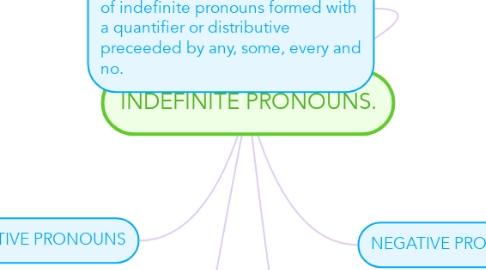
1. NO.
1.1. NOBODY AND NO ONE.
1.1.1. No one and nobody mean the same. Nobody is a little less formal than no one. No one: The textual translation of this word would be "no one". Obviously in Spanish we would never say that, rather we would say "nobody". - Nobody: The textual translation would be "no body". If "no one" sounds weird, "no body" sounds even stranger.
1.1.1.1. EXAMPLES: Nobody came to the party." - "Nobody is home. Right?" - "No one came to help." - "No one called when you were out." -
1.2. NOWHERE.
1.2.1. Means "no side" or "no place". It is a compound word that results from the union of "no" + "where". Where it is translated as "where".
1.2.1.1. EXAMPLES: 1He is going nowhere." - "2.Nowhere is safe now. -3. "There is nowhere else to go. - 4. "The pirates are nowhere to be seen.
1.3. NOTHING.
1.3.1. NOTHING. Means "nothing" and is a compound word formed by the union of no + thing, that is, of "no" + "thing". It is used to say "nothing", in general.
1.3.1.1. EXAMPLES: Nothing is wrong." - - "Nothing is better than a sunny day - "I want nothing for Christmas." - "She does nothing all day."
2. EXAMPLES.
2.1. SOMEBODY: 1 There is somebody at the door. 2.She saw somebody in your house. 3She will bring somebody with ver. 4There is somebody in the room.
2.2. SOMETHING: 2. She left something in the desk. 2. I think there is something wrong with my car.
2.3. SOMEWHERE: 1They found it somewhere in the woods. 2. I've seen you something before. 3. They found somewhere to live.
2.4. SOMEONE: 1They have been talking with someone. 2 she seems to be someone in her town. 3 There is someone waiting the bus 4 They have been talking with someone.
3. AFIRMATIVE PRONOUNS
3.1. SOMEBODY
3.1.1. Somebody is used in affirmative or interrogative sentences to refer to a person.
3.2. SOMETHING
3.2.1. Is the equivalent pronoun used to refer to a thing.
3.3. SOMEWHERE
3.3.1. You use somewhere to refer to a place without saying exactly where you mean.
3.4. SOMEONE
3.4.1. is used in affirmative phrases. It refers to a particular person if you do not know exactly who the person is.
4. Indefinite pronouns do not refer to a specific person, place, or thing. In English, there is a particular group of indefinite pronouns formed with a quantifier or distributive preceeded by any, some, every and no.
5. Look this vídeoshttps://www.google.com.sv/url?sa=t&source=web&rct=j&url=https://m.youtube.com/watch%3Fv%3Dk1Ell_hUzY4&ved=0ahUKEwjS1PDkq_DaAhXBMd8KHa__CwIQwqsBCDEwBA&usg=AOvVaw1qvZhYlg-Ni23cL2tG4v1P
6. NEGATIVE PRONOUNS.
6.1. ANYBODY.
6.1.1. it is used in negative and interrogative phrases and means nothing
6.2. ANYTHING.
6.2.1. It is used in negative affirmative questions.
6.3. ANYWHERE.
6.3.1. Ir is used in negative words or sentences and is for some place in question, and in a negative sentence in no place.
6.4. ANYONE.
6.4.1. It refers to a person in general when the identity of the person does not matter. It is used in two cases. The first is with questions and the second is when you have a negative phrase.
